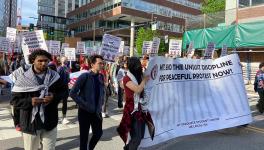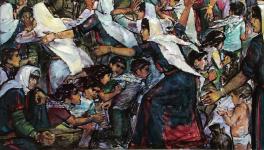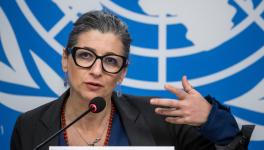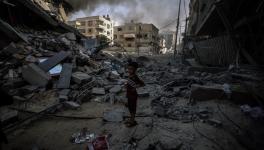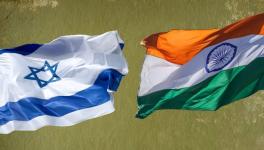There can be no Justification for Genocide: Adila Hassim, Counsel for South Africa Vs Israel in ICJ
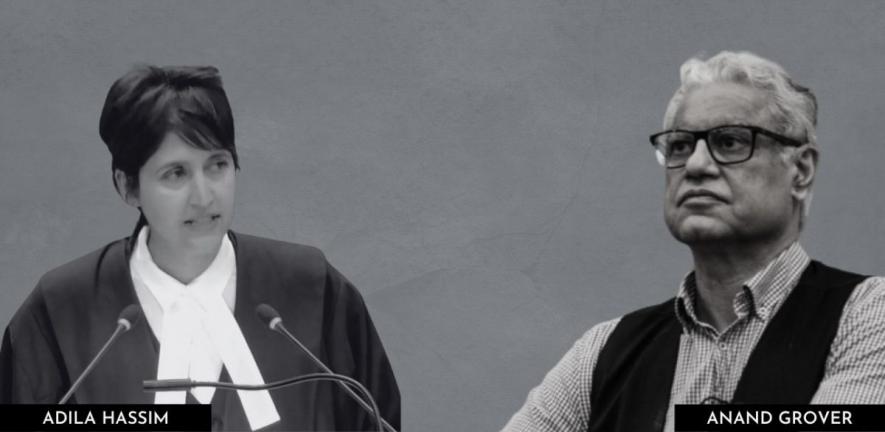
In this exclusive interview, South African advocate Dr Adila Hassim, who was a member of the South African legal team that brought Israel to the International Court of Justice (ICJ) for the ongoing genocide in Gaza, speaks at length with senior advocates before the Supreme Court of India Anand Grover and Indira Jaising on various aspects of the ICJ’s verdict in the case and the way forward.
Anand Grover: Adila, welcome to The Leaflet. First of all, congratulations to you for a great victory. My first question to you is, what is your reaction to the Order of January 26, 2024, of the International Court of Justice (ICJ)?
Adila Hassim: My immediate reaction at the time when we were gathered and we were listening to the judgment was, it was quite an overwhelming response.
It was sort of emotionally overwhelming. I think that my nerves were more frayed in anticipation of the judgment than they were before appearing in the International Court of Justice. So it was a very nervous sort of anticipation. You know, the judgment, is in my view, an excellent one.
As a nation that has fought and defeated apartheid, South Africa has a particular obligation to stand up for the rights of people everywhere.
We think that this was a just outcome. We are very satisfied with the outcome. What happens next, of course, there is a lot to be said about that. But it was a just outcome.
Anand Grover: What made South Africa initiate the action in the International Court of Justice? What is your view and what is the view of the South African government itself?
Adila Hassim: So let me begin with the view of the South African government because it is the South African government that brought the case. The president of South Africa, President Ramaphosa, has issued a statement.
In his statement, he has said that as a nation that has fought and defeated apartheid, South Africa has a particular obligation to stand up for the rights of people everywhere. So he has made it clear that the motivation for South Africa doing this is because of what it sees as its standing as a nation that has fought and defeated apartheid.
There is also a chronological parallel, of course, you know, 1948 was the year of the formal institution of apartheid in South Africa, which coincided with the Nakba. So that important connection between South Africa and Palestine shouldn’t be overlooked. The connection no doubt informed and motivated South Africa in bringing the case. The president has said so.
Anand Grover: I imagine you agree with that.
Adila Hassim: I agree with it. There has been a lot that has been said about some hypocrisy of South Africa in choosing to do this and not choosing to do other things and not standing in defence of others.
I am not sure what the current number of countries supporting the case is, but we do know that there is a 57-member block of the Organisation of Islamic Countries that has supported it.
That is a debate that can be had, and I am not in disagreement with those criticisms, by the way. But the issue is this particular case and whether South Africa was correct in bringing it.
I think it was. I think that South Africa’s connection with Palestine and its history of fighting apartheid gives it particular importance.
Remember, because it goes back to, you know, the position that our former president and leader, President Nelson Mandela took, he famously said that our freedom is incomplete without the freedom of the Palestinians. So this is a continuation of the position basically that President Mandela took.
Anand Grover: Did the South African government try to get the support of other governments in their application? If so, what were the reactions?
Adila Hassim: Yes. So let us just start with, has South Africa tried to? I don’t know the ins and outs of the conversations that were taking place at a diplomatic level.
However, I am aware that discussions were taking place with several countries. I am aware that there has been growing support from multiple countries for the case, and it changes all the time, right?
So I am not sure what the current number of countries supporting the case is, but we do know that there is a 57-member block of the Organisation of Islamic Countries (OIC) that has supported it. Malaysia has supported it. Turkey has supported it. Jordan, Bolivia, Namibia, the Maldives, Pakistan, Colombia and Brazil are some of the other countries that have supported it.
Anand Grover: Now I want to come to the legal team. How was it picked?
Adila Hassim: I think that the government is probably best placed to answer that question. I have been told by our client that they wanted to put together a strong team with experience in international law and human rights and a demonstratable track record in defending rights.
Secondly, the team is a big one because the case is so huge. So we needed to put together all of our resources. We had to do that in a very short space of time since the case was brought on an urgent basis.
The intense period between December 29 and the hearing on January 11, required us to debate, discuss, write, rewrite, comment, check and double-check our facts, which were very, very integral to the case.
The team is made up of a phenomenal team of advocates. They are all excellent. I would like to point out that we have Professor John Dugard, who is a brilliant and internationally recognised scholar on these issues and on international law.
We also have Vaughan Lowe K.C., who contributed to the depth of our knowledge of international law.
Anand Grover: Adila, I must commend the team for their brilliant draft of the application, and I imagine it took a lot of time and day and night of sweat and labour. Can you tell us something about that?
Adila Hassim: Yeah, to say that we worked day and night is no exaggeration.
It is partly because of what I just said. This case was brought on an urgent basis. So South Africa filed its application on December 29, 2023. We were in court on January 11.
So there is the first phase of preparation of the application. Then there is the intense period between December 29 and the hearing on January 11, which required us to debate, discuss, write, rewrite, comment, check and double-check our facts, which were very, very integral to the case.
So to say we worked day and night is really no exaggeration. Of course, this team was dispersed. So we had to do a lot of this on virtual platforms. In fact, the first time that the whole team met in person was when we arrived at the Hague.
Then, once we arrived at the Hague, it was another process of work in the build-up to the hearing, which commenced on January 11. I mean, it feels like we lived a lifetime just in the couple of days that we were in the Hague before the hearing.
The case was about the atrocities being committed against Palestinians living in Gaza since October 7. It did not include the West Bank as a whole. We did that deliberately.
Anand Grover: Yeah, that is evident from the application. Could you tell us something about how the division was made amongst the lawyers who appeared?
Adila Hassim: Well, it was done consultatively within the legal team. Our strategy was to ensure that the key elements of the case are built-up. So we thought the best way to do it was to have different topics addressed by specific individuals within the team.
As you know well, a case can be presented in many ways. I could have taken three points and we could just have two people speaking with three people speaking for the entire team, but we deliberately chose to have all the senior counsel address a specific topic.
Anand Grover: Adila what do you think was your forte in terms of your background, etc., for being picked as the first council to argue?
Adila Hassim: That is a hard question to answer. Perhaps someone else might be a better person to answer that. I would only say that I have made a practice in constitutional law and human rights. It is not just practice, but of course, a lot of study.
I have a history of taking on cases that maybe, and it is very hard for me to say this, and I say it with all humility but that, to be clichéd, speak truth to power.
This case is quintessentially a case of speaking truth to power.
Anand Grover: Adila, like always, you are modest, but we understand. Now, I want to ask you that in the application, there is a reference to the Nakba, which you referred to earlier, but there is not a lot of emphasis on the history (of the Palestinian conflict). Is there a deliberate strategy just to focus on the genocide that is occurring now?
Adila Hassim: Yeah, actually it was deliberate. I mean, you know, the context of this case, it could go back, you know, a long time. We could have spent time expanding on that context, but we chose to limit it to what has taken place since October 7, 2023. We chose to limit it also to what is taking place in Gaza.
Genocide Convention has ergo omnes jurisdiction, State parties can bring other State parties to the court. So that is what informed the South African government’s reliance on the Genocide Convention.
So the case was about the atrocities being committed against Palestinians living in Gaza since October 7. It did not include the West Bank as a whole. We did that deliberately. That is not to say that there aren’t problems in the West Bank. There are and they are huge, but we needed to be focused.
This is not an easy case to bring. We needed to be focused and we needed to be able to show the court that we have facts that pertain to this group of people living in Gaza.
Anand Grover: I noticed that the government chose genocide as the main issue. Why not crimes against humanity? Is there a reason for that?
Adila Hassim: Well, it is not because the government believes that there are no crimes against humanity being committed in Palestine. We think that there is a lot of conduct that has happened that violates international humanitarian law. However, the ICJ has jurisdiction over the Genocide Convention. Israel has ratified the Genocide Convention.
It has not submitted any reservations to the Genocide Convention. South Africa, of course, has also ratified the Genocide Convention. Genocide Convention has ergo omnes jurisdiction, State parties can bring other State parties to the court. So that is what informed the South African government’s reliance on the Genocide Convention.
Anand Grover: Now genocide is known to be the crime of crimes and written about in that fashion. The threshold requirement for genocide action to be brought forth is an existing dispute. There was a dispute about whether a dispute exists because Israel tried to say that there have to be negotiations, etc. How do you read that? Of course, the court has accepted the South African version, but what is your reaction to the counter of the Israeli government?
Adila Hassim: It was weak. The Israeli government placed a lot of emphasis on the issue of the note verbale—a formal diplomatic communication to Israel, of our view that a genocide was taking place.
They responded by saying they would like a meeting. South Africa did not enter into discussions with Israel after having sent the note verbale and they said that this was an indication that South Africa was never genuinely interested in having any discussions or negotiations with Israel to see whether there could be a resolution outside of court.
Now, the first thing is that in order for the ICJ to have jurisdiction over a dispute, the requirement is that a dispute must have ‘crystallised’ at the point of time that the application is filed. That can happen in many ways. No strict procedure is required for that and there certainly is no requirement of having to negotiate with the other side before going to the court.
That there was a dispute was clear from the fact that South Africa had announced its view in multilateral settings in the United Nations General Assembly, for example, on the risk of genocidal conduct. Israel had denied that it was committing a genocide. There was a dispute.
Anand Grover: Can you explain to our readers the concept of genocide in the convention?
Adila Hassim: So the Genocide Convention, you know, first of all, we remember that the Genocide Convention, signed in 1948, was a direct result of the Holocaust, and it was a very firm commitment by the international community that such tragedies should never be repeated. The deliberate destruction of a national, racial or ethnic group or part of a group of people should never be tolerated.
South Africa had announced its view in multilateral settings in the United Nations General Assembly, for example, on the risk of genocidal conduct. Israel had denied that it was committing a genocide. There was a dispute.
That is what the Genocide Convention is about. Article 2 of the convention sets out five categories of conduct that can be characterised as genocidal, and of course, it is not just about the conduct, as we know from the Genocide Convention, it is also about intent.
It has to be shown that there is a specific intent to commit genocide. When we brought the case, we brought it on four of the five categories. Those were the four categories on which the court agreed that a plausible case had been made— Articles 2A to D. The court agreed with us on that.
Anand Grover: Intent, as you say, is very important. Without intent, there cannot be any real conviction of genocide. What is the meaning of intent? How is it manifested? How is it inferred? Is it inferred only because people in power in a State accused of committing genocide are speaking in those terms?
Adila Hassim: The bar is so high, right? It requires specific intent. Several things go into establishing intent. Remember, each case is different. So it will be inferred from the pattern of conduct that is taking place, from the knowledge that those who are perpetrating the conduct or encouraging the contact have.
So if you have the knowledge that a particular act is going to wipe out a part or a segment of a population and you continue anyway, then intention can be inferred. Then, most importantly, intention is about the state of mind of the perpetrator.
That is why the speech of senior government officials is so important. What is especially important about speeches is when they are made by those in power, by people like the Prime Minister and the minister of defence, it has legal value.
That is why we referred to the specific speech by people in power in Israel, that showed that there was an intention, not merely to wipe out Hamas, but to go further than that.
When we brought the case, we brought it on four of the five categories. Those were the four categories on which the court agreed that a plausible case had been made— Articles 2A to D. The court agreed with us on that.
So we put up all of those statements that had been made. That was reiterated in the judgment. When the President of the ICJ was dealing with this specific issue of what the powers that be in Israel said, what can be made of their state of mind, etc., they referred specifically to the statements that were made by the Israeli President Isaac Herzog and Israeli defence minister Yoav Gallant.
Remember what they were saying. They were saying Gaza won’t return to what it was before. They were saying we are going to eliminate everything in Gaza. They referred to Gazans as human animals. So, you know, it was very stark.
This is not ambiguous language. It is very clear.
Anand Grover: But the Israeli side tried to argue that those ministers do not represent what the government is actually trying to do. They argued that they did not have an intention to wipe out civilians, but civilians were being used as meat shields by armed members of Hamas.
Another point I wanted to ask you is that it is not only the statements that make the intent clear, it is also not reprimanding others who are actually doing it.
Because that happens in a number of States. Ministers make statements and the leaders that be, they don’t actually reprimand them. So such conduct and speech are allowed to continue. Is that a very important factor?
Adila Hassim: Yes. So, you know, this is something that is often overlooked.
In this case, it wasn’t just saying that a genocide was taking place, but that it was not being prevented, right? So the obligations of the States parties to the Genocide Convention are also to prevent genocide, conspiracy to commit genocide, incitement to commit genocide and complicity in genocide, right? So it is not simply about trying to show that genocide is taking place.
You would be transgressing the convention if you do not reprimand or punish those who are inciting genocide.
So as those comments are being made, it can’t be an answer for Israel to say that those who are making them are not speaking on behalf of the government. They are speaking on behalf of the government. They are the highest government leaders. This is the war cabinet that was speaking.
If you have the knowledge that a particular act is going to wipe out a part or a segment of a population and you continue anyway, then intention can be inferred.
Moreover, look at what was happening on the ground. The fact that no one, not the Prime Minister or anyone at the highest levels of the Israeli government, called out any of the officials who were inciting genocide is why the court ruled the way it did.
Anand Grover: One of the other points that Israel made was that Hamas has not been made a party, even though they are a perpetrator and your answer was that they are not a State, but when non-State actors are actually at war, would it have been wise to make Hamas a party? Or do you think that would have been foolish?
Adila Hassim: It was neither wise nor foolish. It was simply not possible. The court does not have jurisdiction over a non-State party.
That does not mean that non-State parties are not to be held accountable, including for crimes against humanity. It is just that this forum was not the forum for it. There have been charges brought in the International Criminal Court and the chief prosecutor is investigating crimes against humanity, you know, committed by both sides and that is where Hamas’s role needs to be scrutinised.
Anand Grover: A sort of a side to that is that according to Israel, South Africa did not condemn Hamas sufficiently. What is your answer to that? I mean, the government has answered it. What do you think?
Adila Hassim: Well, I do not know what sufficiently is. October 7 was a long time ago. The fact that you do not open every statement with a condemnation of Hamas does not mean you do not condemn Hamas sufficiently.
The country (South Africa) and the government have been very clear that they condemn Hamas. They said it at the time it happened and they have repeated it several times.
The South African minister of justice, in his opening remarks, repeated that, and they said it at the end, once the judgment had been delivered. The minister of international relations repeated it.
More importantly, our government has welcomed the court’s statement, although it is obiter, that Hamas must release hostages.
Anand Grover: For provisional measures to be instituted and directed, there has to be a ‘plausible case’ of genocide. What does a plausible case mean? Is it similar to prima facie case?
Adila Hassim: Yes, this is a very debated thing. What is this concept of ‘plausible’? Why don’t we just use the term prima facie?
The bar is quite low. The court has made it clear in previous judgments, such as the Gambia Myanmar judgment, that when it says ‘plausible case’, it means that there is sufficient evidence before the court that a genocide is taking place or that there is a risk of genocide, and because of the importance and the magnitude of this crime, provisional measures have been indicated.
This does not mean that the court is making a determination that genocide is happening. That is part of the second phase of the case, the merits phase.
So establishing a plausible case is a low hurdle to cross, but it is not so low that anyone can come and claim genocide is happening.
Anand Grover: You know, the Indian judge (Judge Dalveer Bhandari) made a huge point of this in his declaration, saying this is not to say that Israel is guilty of genocide. It is only a bar for a plausible case to be made out. What is your reaction? Was it necessary for him to do so?
Adila Hassim: He is correct. It is only a reiteration of what we all know, that it is a lower hurdle at the provisional measures stage.
It can’t be an answer for Israel to say that those who are making [genocidal comments] are not speaking on behalf of the government. They are speaking on behalf of the government. They are the highest government leaders.
When he said that it is a lower standard that applies at the provisional measure stage, he also said that all participants in the conflict must ensure that the fighting and hostilities come to an immediate halt.
Anand Grover: Yes, and that too at the stage of provisional measures.
The court has substantially granted all the measures that you asked for, except the final ceasefire, as it were. Do you think it is in any way a defeat? Or do you think the measures that have been instituted by the court or are being directed are a victory for South Africa?
Adila Hassim: Yes, we asked for a ceasefire. We did not get a ceasefire. Therefore, in that respect, we did not get what we had asked for, but only that one thing. All other measures have been agreed to and directed, so I don’t see it as a defeat.
We anticipated that the court Order might now contain directions with regard to the ceasefire. We appreciated that the court was in a difficult position in that respect since Hamas was not before the court. The court could not order a ceasefire against only one side of the conflict.
In issuing the other Orders, the extent to which Israel will comply with those Orders will depend on how it conducts its military operations. It can’t provide humanitarian aid while at the same dropping 2,000-pound bombs.
So the Order does require Israel to enable the delivery of humanitarian aid. Now the ball is in Israel’s court. The UN secretary-general has also made it clear that it is impossible to deliver humanitarian aid while bombs are raining down.
But that is a political decision that needs to be made. It is up to Israel to ensure compliance with the Orders.
Anand Grover: Does the requirement of reporting back after a month allow South Africa to push for the final ceasefire? For example, if Israel doesn’t comply with any of the measures, would it be possible to argue that unless there is a complete ceasefire, the other Orders cannot be complied with?
Adila Hassim: It is possible to argue that yes, and I think that it will mean an end to hostilities on both sides. Obviously, that is what a ceasefire means. That is what the UN has called for in the past. Early on, they asked for a humanitarian truce. A majority of the countries signed on the resolution. India did not.
You would be transgressing the Genocide Convention even if you do not reprimand or punish those who are inciting genocide.
Anand Grover: What is your view on this one-month reporting? What happens after the month has passed? Do they just report or is it an opportunity for more Orders?
Adila Hassim: I think it is potentially an opening. It is really up to Israel and its allies primarily the US to establish the direction the case takes from here.
So far, we have not seen compliance with the Order. The death and destruction have continued. Aid to the United Nations Agency for Palestinian Refugees UNRWA has been cut off. That has been a shocking development.
So if Israel were to come to the court and say, these are the measures we have taken, of course, South Africa would then have an opportunity to respond to that report.
I don’t want to preempt anything and say what can or cannot happen. I just want to say that I think that this is a classical case of supervisory jurisdiction of the court.
Now in domestic courts, you can ask the court to supervise compliance only if you are able to show that the government can’t be trusted with complying with court Orders. That is why domestic courts retain supervisory jurisdiction.
For now, ICJ has not told Israel how to comply. ICJ has only told Israel that there is a plausible claim of genocide and asked it to take steps to ensure those claims are addressed as per the Genocide Convention, to which Israel is a signatory.
Anand Grover: If Israel fails to comply with the Order, is the route that of the UN Security Council and the UN General Assembly?
Adila Hassim: That is exactly where this case belongs now. The case now belongs with the UN General Assembly and the UN Security Council. It is crucial for the legitimacy of the court and a rules-based system that other institutions of the international legal system do their part.
Anand Grover: Suppose some Western powers such as the US veto action in the case, would it be a dead end, or would there be a moral victory?
Adila Hassim: See, at the end of the day, this will come down to moral obligations because the court can only go so far. It can’t enforce its Orders.
It would be a huge risk for the US, for example, to blatantly ignore what the court has said. It would jeopardise its moral standing in the international community. I don’t think that the US would want to be perceived as a State that does not uphold the rule of law.
Anand Grover: Do you know that at democratic conventions, meetings, etc., there have been protesters complaining about the Biden administration’s lack of support for the actions of the court?
Adila Hassim: Hmm. That is how power gets held to account; when an elected government’s own electorate and constituencies put pressure on the government. This will be a fillip in all those sectors of civil society that have been pushing this.
The ICJ has made it clear in previous judgments, such as the Gambia Myanmar judgment, that when it says ‘plausible case’, it means that there is sufficient evidence before the court that a genocide is taking place.
A case has been brought against President Biden for his conduct in supporting Israel. This will be emboldened by the court’s judgment. That is the terrain in which it should be playing out. The US should be facing pressure from its own citizenry.
Anand Grover: What about the Western powers, such as the US, the European Union and the UK, who give Israel financial aid and weapons? Where do they stand in terms of legal complicity and liability?
Adila Hassim: There is a very serious risk of a plausible claim being made that countries that are weaponising Israel directly resulting in the killing of more Palestinian civilians in Gaza, are complicit.
Anand Grover: Do you think the South African government will go that far?
Adila Hassim: I don’t know (smiles).
Anand Grover: What is your reaction to Germany making clear that it will support Israel?
Adila Hassim: It is not surprising because of the relationship between Germany and Israel, and because of Germany’s past. But what I think has been the most important development there, is the response by Namibia to Germany’s position—
Anand Grover: The genocide in Namibia?
Adila Hassim: Yes. So Namibia’s coming out to say this is entirely hypocritical of Germany, and putting facts out in public of the genocide against the Namaqua and Herero people right at the beginning of the 20th century is something for which Germany has never answered properly. There have been talks of reparations but Germany has never properly accepted that what it did in Namibia qualifies as a genocide. So I would say, watch this space.
Anand Grover: Is it not ironic that Israel, which was founded by Jewish people, who were subjected to the Holocaust by throwing out Palestinians are today being told that they are committing genocide? What is the moral imperative of this in international law and politics? What does it mean when we have such a situation?
Adila Hassim: Let me begin first by saying that what happened in the Holocaust was unprecedented and we haven’t seen the likes of that kind of genocide since then.
In issuing the other Orders, the extent to which Israel will comply with those Orders will depend on how it conducts its military operations. It can’t provide humanitarian aid while at the same dropping 2,000-pound bombs.
We have seen genocides, but we have not seen something like the Holocaust. However, we must remember that it doesn’t mean that genocide takes place only when it rises to the level of what we saw in the Holocaust.
The best people to answer this question are people who have been directly affected by it.
Many Jews living in Israel and Jews in the diaspora, particularly those who have spoken out, such as the Jewish Voice for Peace and the South African Jews for a Free Palestine have said that in their own experience, they know a genocide when they see it happening. To them, what is happening in Gaza is an echo of what took place and what was perpetrated against them.
That is why this action is so important— to stop what is going on.
I will say one last thing: When do you say it is a genocide? When do you intervene? Do you wait until a certain number of people have been killed? Is there a threshold? What is the number? What is the percentage of a population that needs to be killed? Because it is a continuum.
So I think that the moral obligation is to intervene earlier rather than later, even if it is hard to show that a genocide is taking place. The risk is very clear, and the damage may be irreparable.
Indira Jaising: Adila, you made a very unusual and creative argument that Israel was attacking its own occupied territory because Gaza was effectively under its control. Could you elaborate on the legal consequences of that?
Adila Hassim: That is a very important point. It is also a contentious one. But let us just remember that this is not a conflict between two countries. This is a conflict between a government and people who are under the oppressive rule of that government.
If Israel were to come to the court and say, these are the measures we have taken, of course, South Africa would then have an opportunity to respond to that report.
The UN’s committees and commissions of inquiry have done investigations and they have expressed the view that Israel is an apartheid State. That is a very different scenario, a set of circumstances from two countries in direct conflict with one another.
Now, what Israel has said in response to that is that Gaza is no longer under the occupation of Israel because it pulled out in the mid-2000s.
But the reality is that Gaza is still under siege. It is under Israel’s control— its airspace, land space and sea are all under Israel’s control. The movement of people and goods is under the control of Israel.
What is taking place must be seen in the context of a people that are under a belligerent occupation. The attacks from one side, and I make it absolutely clear that in saying this, I am not at all condoning what Hamas did on October 7, but the attacks against Israel from Palestinians, whether it is Hamas, Palestinian Authority, or any other militant group, are attacks by groups that are under the boot of the Israeli government.
More than that, they are under the boot of the Israeli army. So, there will be no peace for Israel and its citizens themselves for as long as this situation continues.
So when Israel says we are going to wipe out Hamas. Okay. Then what? What happens after that? Israel has not answered that question. What do they see is going to happen, going forward?
There is a very serious risk of a plausible claim being made that countries that are weaponising Israel directly resulting in the killing of more Palestinian civilians in Gaza, are complicit.
Israeli or Jewish commentators, for example Thomas Friedman in the New York Times, who have done a lot of work in the Middle East, have also raised this question: What happens the day after? Because Israel’s actions are not going to contribute to peace.
What Israel is doing ultimately harms its own citizens.
Indira Jaising: There have been reports that sections within Israel have been complicit with this whole attack. There has also been some information about Hamas getting arms from the Israeli army. What is your take on this?
Adila Hassim: Hamas was supported by Israel and the US in order to divide Palestinians, so you have got the Palestinian Authority in the West Bank, which has fairly been criticised for being ineffective, and then you have got Hamas. This division between them was enabled by Israel and the US.
Indira Jaising: One of the arguments that you made was that there can be no justification whatsoever for genocide. This means that the whole issue of self-defence becomes irrelevant, and so does any talk of proportionality of self-defence. Would you agree with that? What was your approach to that issue?
Adila Hassim: That is correct. Self-defence is a justification. But there can be no justification for genocide. So that is the simple point we are making in this case.
The UN’s committees and commissions of inquiry have done investigations and they have expressed the view that Israel is an apartheid State.
Does Israel have a right to self-defence? Absolutely. Does it have a right to commit genocide in response? Absolutely not.
Anand Grover is a senior lawyer at the Supreme Court and co-founder of The Leaflet.
Get the latest reports & analysis with people's perspective on Protests, movements & deep analytical videos, discussions of the current affairs in your Telegram app. Subscribe to NewsClick's Telegram channel & get Real-Time updates on stories, as they get published on our website.











